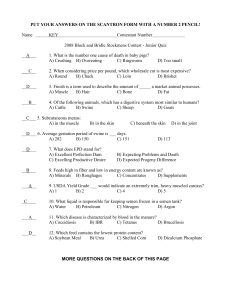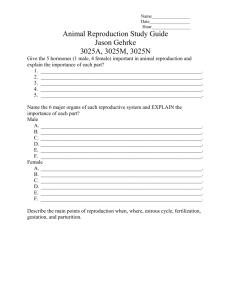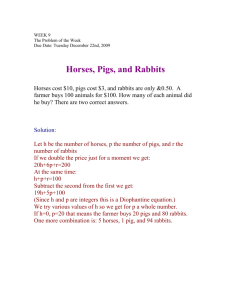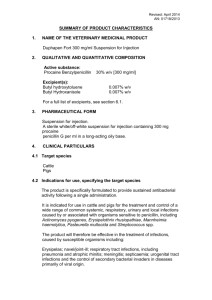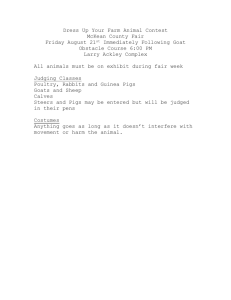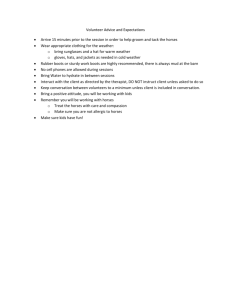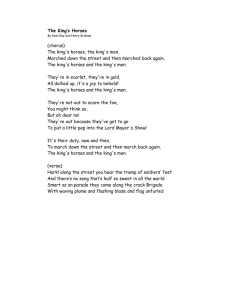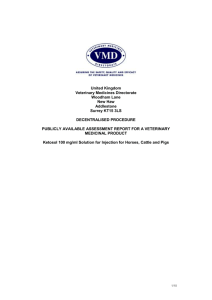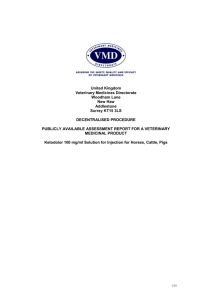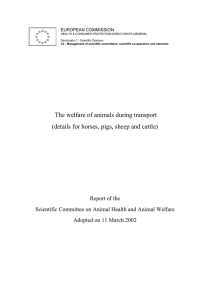Revised: January 2012 AN: 00724/2011 SUMMARY OF PRODUCT
advertisement
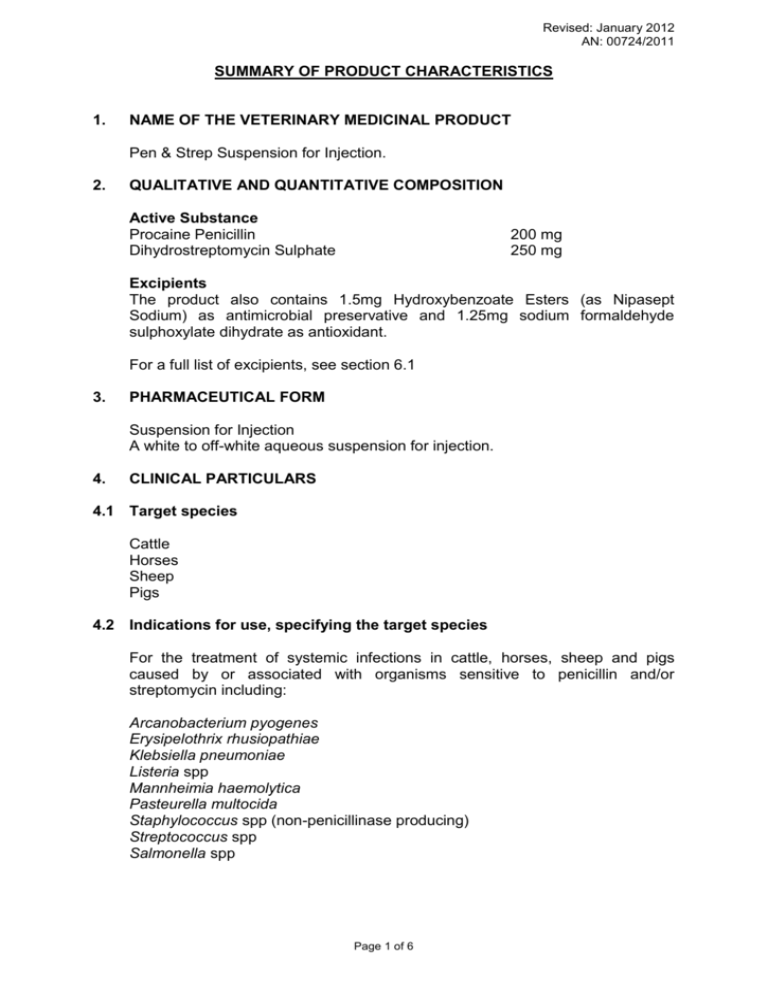
Revised: January 2012 AN: 00724/2011 SUMMARY OF PRODUCT CHARACTERISTICS 1. NAME OF THE VETERINARY MEDICINAL PRODUCT Pen & Strep Suspension for Injection. 2. QUALITATIVE AND QUANTITATIVE COMPOSITION Active Substance Procaine Penicillin Dihydrostreptomycin Sulphate 200 mg 250 mg Excipients The product also contains 1.5mg Hydroxybenzoate Esters (as Nipasept Sodium) as antimicrobial preservative and 1.25mg sodium formaldehyde sulphoxylate dihydrate as antioxidant. For a full list of excipients, see section 6.1 3. PHARMACEUTICAL FORM Suspension for Injection A white to off-white aqueous suspension for injection. 4. CLINICAL PARTICULARS 4.1 Target species Cattle Horses Sheep Pigs 4.2 Indications for use, specifying the target species For the treatment of systemic infections in cattle, horses, sheep and pigs caused by or associated with organisms sensitive to penicillin and/or streptomycin including: Arcanobacterium pyogenes Erysipelothrix rhusiopathiae Klebsiella pneumoniae Listeria spp Mannheimia haemolytica Pasteurella multocida Staphylococcus spp (non-penicillinase producing) Streptococcus spp Salmonella spp Page 1 of 6 Revised: January 2012 AN: 00724/2011 and for the control of secondary bacterial infection with sensitive organisms in diseases primarily associated with viral infection. 4.3 Contraindications Contraindicated in known cases of hypersensitivity to penicillins. 4.4 Special Warnings for Each Target Species Use with care in animals known to have kidney disease or defective renal function. Do not exceed the recommended dosage or duration of treatment. 4.5 Special Precautions for Use i. Special precautions for use in animals: Care should be taken not to exceed the recommended dosage. Aminoglycosides have a narrower margin of safety than beta lactam antibiotics. ii. Special precautions to be taken by the person administering the product to the animals: Care should be taken to avoid accidental self-injection. In the case of accidental self-injection, seek medical advice immediately. Penicillins and cephalosporins may cause hypersensitivity (allergy) following injection, inhalation, ingestion or skin contact. Hypersensitivity to penicillins may lead to cross-reactions to cephalosporins and vice versa. Allergic reaction to these substances may occasionally be serious. 1. Do not handle this product if you know you are sensitised, or if you have been advised not to work with such preparations. 2. Handle this product with great care to avoid exposure taking all recommended precautions. 3. If you develop symptoms following exposure, such as a skin rash, you should seek medical advice and show the doctor this warning. Swelling of the face, lips or eyes or difficulty in breathing are more serious symptoms and require urgent medical attention. Wash hands after use. 4.6 Adverse reactions (frequency and seriousness) Occasionally in sucking and fattening pigs, administration may cause a transient pyrexia, vomiting, shivering, listlessness and in-coordination. A palpable but transient local reaction may occur at the site of intramuscularadministration in horses. Page 2 of 6 Revised: January 2012 AN: 00724/2011 4.7 Use during pregnancy, lactation or lay Pen & Strep can be safely administered to pregnant and lactating animals. However in pregnant sows and gilts a vulval discharge which could be associated with abortion has been reported. 4.8 Interactions with other medicinal products and other forms of interaction Do not administer with other antibiotics such as tetracyclines or with other aminoglycosides. 4.9 Amount to be administered and administration route Shake the vial before use. Administer by deep intramuscular injection. Recommended dosage rate is 8 mg/kg bodyweight procaine penicillin with 10 mg/kg bodyweight dihydrostreptomycin sulphate equivalent to 1 ml per 25 kg bodyweight. Treatment should be given once daily for up to 3 consecutive days. The maximum dose volume administered at one site should not exceed 15 ml for horses, 6 ml for cattle, 3 ml for sheep and 1.5 ml for pigs. 4.10 Overdose (symptoms, emergency procedures, antidotes) (if necessary) No treatment specified. 4.11 Withdrawal periods Animals must not be slaughtered for human consumption during treatment. Sheep: Not to be used in sheep producing milk for human consumption. Sheep intended for human consumption should not be slaughtered until 31 days after the last treatment. Cattle: Milk for human consumption must not be taken during treatment. Milk for human consumption may only be taken from cows after 60 hours from the last treatment. Cattle intended for human consumption should not be slaughtered until 23 days after the last treatment. Pigs: Pigs intended for human consumption should not be slaughtered until 18 days after the last treatment. Horses: Not to be used in horses intended for human consumption. Treated horses may never be slaughtered for human consumption. The horse must have been declared as not intended for human consumption under national horse passport legislation Page 3 of 6 Revised: January 2012 AN: 00724/2011 5. PHARMACOLOGICAL PROPERTIES Pharmacotherapeutic group: Antibacterials for intramammary use, Combination of antibacterials for intramammary use, Beta-lactam antibacterials, penicillins, combinations with other antibacterials ATCvet Code: QJ51RC03 5.1 Pharmacodynamic properties Penicillin G is a beta-lactam antibiotic and its structure contains the beta-lactam ring and thiazolidine ring common to all penicillins. Beta-lactam antibiotics prevent the bacterial cell wall of susceptible Gram-positive bacteria from forming by interfering with the final stage of peptidoglycan synthesis. They inhibit the activity of transpeptidase enzymes, which catalyse cross-linkage of the glycopeptide polymer units that form the cell wall. They exert a bactericidal action but cause lysis only of growing cells. Dihydrostreptomycin is an aminoglycoside antibiotic active against gramnegative aerobes, which after penetration of the cell envelope binds to receptors on the 30S sub unit of the bacterial ribosome. It induces misreading of the genetic code on the messenger ribonucleic acid (mRNA) template, causing bacteriostasis. Aminoglycosides exert synergistic action in combination with beta-lactam antibiotics. 5.2 Pharmacokinetic properties After injection of Pen & Strep, the procaine penicillin is rapidly absorbed from the site of injection, with maximum penicillin levels of between 1 and 2 µg/ml for horses, sheep and pigs and 0.5 µg/ml for cattle, being obtained within 2 hours of injection. The penicillin elimination half-lives are approximately 2 hours for sheep and pigs, 5 hours for cattle and 11 hours for horses. Dihydrostreptomycin is absorbed at a similar rate, with maximum plasma levels of 23 µg/ml being obtained for cattle, sheep and pigs, and 15 µg/ml for horses. The elimination half-lives are approximately 2 hours for cattle, sheep and pigs and 4 hours for horses. Page 4 of 6 Revised: January 2012 AN: 00724/2011 6. PHARMACEUTICAL PARTICULARS 6.1 List of excipients Hydroxybenzoate Esters (as Nipasept Sodium) Sodium Formaldehyde Sulphoxylate Dihydrate Povidone K12 Polysorbate 80 Sodium Citrate Dihydrate Disodium Edetate Dihydrate Cetrimide Citric Acid Anhydrous Water for Injections 6.2 Incompatibilities None known. 6.3 Shelf-life Shelf life of the veterinary medicinal product as packaged for sale: Glass: 9 months, Plastic: 24 months Shelf life after first opening the immediate packaging: 28 days. 6.4 Special precautions for storage Glass: Do not store above 25C. Plastic: Store between 2 - 8C Protect from light. Following withdrawal of the first dose, use the product within 28 days. Discard unused material. 6.5 Nature and composition of immediate packaging Clear type II multidose glass vials of 50 ml and 100 ml sealed with bromobutyl bungs and aluminium caps. Clear polyethylene terephthalate plastic vials of 50 ml, 100 ml and 250 ml sealed with bromobutyl bungs and aluminium caps. Not all pack sizes may be marketed. 6.6 Special precautions for the disposal of unused veterinary medicinal products or waste materials derived from the use of such products, if appropriate Any unused veterinary medicinal product or waste materials derived from such veterinary medicinal products should be disposed of in accordance with local requirements. Page 5 of 6 Revised: January 2012 AN: 00724/2011 7. MARKETING AUTHORISATION HOLDER Norbrook Laboratories Limited Station Works Camlough Road NEWRY Co. Down, BT35 6JP Northern Ireland 8. MARKETING AUTHORISATION NUMBER Vm 02000/4100 9. DATE OF FIRST AUTHORISATION Date: 12th March 1991 10. DATE OF REVISION OF THE TEXT Date: January 2012 Page 6 of 6
